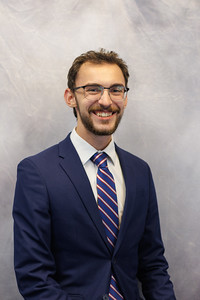Mr. Brandon Fall: Beyond All Odds
Author: David Markopoulos | Living Education
These posts summarize the forums that our Living Education-Charlotte students attend each week.
In a recent forum presentation, Regional Pastor Mr. Brandon Fall spoke to the Living Education-Charlotte students on the subject of God’s design in the universe. God’s handiwork is visible throughout the many wonders of creation, and the incredible design of our universe points directly to Him.
Ramifications of a Designer
As we in the Church understand, there are numerous proofs throughout creation that point to God, disproving the atheistic idea of the universe randomly coming into existence. The simple reality is that to believe in evolution requires more effort than to accept the evidence of intelligent design. The ramifications of intelligent design dictate purpose, order, and intent in everything that exists.
God’s Detailed Design
We see evidence of that intentional design in unique ways. For example, our sun is not only 400 times larger than our moon, it is also 400 times further away—meaning that from earth, we are able to witness perfect solar eclipses. The mathematical improbability of such precision points not to blind chance, but the wisdom of an intelligent Designer.
The dramatic scale of the universe in which we live is also deeply impressive and an exciting thing on which to meditate. Mr. Fall explained that the earth could fit into Jupiter 1400 times—and that Jupiter could fit into the sun 900 times itself. While we may not realize the size and scale of the universe in which we live, it all points to the design and creativity of God.
Conditions for Life
Mr. Fall explained that in the past, there have generally been two criteria by which scientists believed life could exist on other planets:
1. A planet needs the right kind of star
2. A planet must be the right distance away from a star
Using this criteria, scientists have carefully searched for life on other planets. With only two parameters, it should seem easy—but over time, we have determined far more specific criteria for the kind of planet that can host life. As more and more criteria is added all the time, the odds of a planet like our earth that is capable of hosting life becomes far more slim—showing that the earth is unique by God’s design.
Stretching the Heavens
Mr. Fall pointed out that the truth about the universe defies the logic and probability that tries to refute the idea of a Creator. It takes far more blind faith to believe in blind chance than it does to believe in God’s intelligent design. That design is visionary and expansive—Isaiah 40:22 states: It is He who sits above the circle of the earth… who stretches out the heavens like a curtain, and spreads them out like a tent to dwell in.” Science shows the universe is constantly and rapidly expanding—something that God has placed in motion.
The Same Sky
The design and beauty of the universe and its elements is incredibly complex, and points to the wonderful and creative mind of God. King David mused in Psalm 8:3-4: “When I consider Your heavens, the work of Your fingers, the moon and the stars, which You have ordained, what is man that You are mindful of him, and the son of man that You visit him?” We can be filled with wonder and excitement at the thought that the sky full of stars we see today is the same sky King David looked at ages ago, and that the God who created it all is the same God who has called us now.

David Markopoulos is a Living Education alumnus from the 2023-2025 school years. Originally hailing from Chicago, he currently works for the Living Education program.
